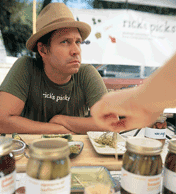
 |
||
The Yale Alumni Magazine is owned and operated by Yale Alumni Publications, Inc., a nonprofit corporation independent of Yale University. The content of the magazine and its website is the responsibility of the editors and does not necessarily reflect the views of Yale or its officers. |
When Rick Field ’85 was a television producer, working at NOW with Bill Moyers on PBS, he'd make pickles on weekends and host pickle-tasting parties for friends. When the NOW job ended, he started a pickle company, Rick’s Picks, from an office near New York City’s traditional pickle enclave on the Lower East Side. Field’s business, which includes such products as Windy City Wasabeans and Phat Beets, is expanding from its modest roots. Jars of his vinegary veggies can now be found at Whole Foods and other retailers in 15 states. But Field, 42, doesn’t rule out an eventual return to film or television. A compulsive schmoozer, he holds court every Wednesday where his business began, the Union Square farmers market. Y: Your business has really taken off. Why do you still man your own pickle stand? F: Working at the farmers market, I’m able to interface directly with my favorite customers, many of whom are 80-year-old ladies. They’re really cute and they never buy anything and they like to talk. Y: What about? F: The weather, the way pickles used to be made, their arthritis. A lot of people look at my farmstand as an opportunity for a little bit of free psychotherapy or as a bully pulpit for their own agenda. The biggest complaint I get is that people miss their ancestral pickling experiences. They miss their mother’s pickles, they miss their grandmother’s pickles, they miss the experience of watching their grandmother make them. I don’t think I really was quite prepared when I started this for the degree to which what I’m doing is tapping into people’s personal memories in a very meaningful way. Y: Was it a relief to get out of television, which is supposed to be a cutthroat business? F: Well, I think almost every business is a cutthroat business. Y: Pickle making? F: Absolutely! You’ve got retailers that’ll nickel and dime you, take forever to pay you, that won’t support your brand—they’ll send stuff back if they don’t like it and ask for their money back. There’s tons and tons of things that people do to you to make it hard for you to ultimately make money. Y: How has your experience as a producer helped you? F: I used to always say in television that basically every decision boils down to a choice between art or money. You could either have it be faster, cheaper, easier, or it could be more beautiful, more elaborate, more complicated. The goal, of course, is to make the best-looking thing at the best price. And I’m a stickler for the aesthetics of it. I think I would be probably well advised to be a little more ruthless about some of the decision-making. Y: Where could you could be cutting corners? F: Dill flowers. That’s a great example. Dill flowers look beautiful in the jar, and they transmit the essence of the dill flavor in an optimal way. But they’re not available all the time, they can be troublesome to source, they can vary widely in their quality. Nonetheless, when I have access to them, I’ll always use them as my way of bringing dill into the mix. Y: And what product do the dill flowers go into? F: The dill flowers are in the Spears of Influence, which starts out as a traditional Kirby cucumber dill pickle. It has fresh dill, which you would find in some format in most dill pickles. But it also has, in the brine, cumin powder and fresh lime juice. You recognize the original nature of the dill pickle that you’re familiar with, you recognize the integrity of the original vegetable, i.e., the cucumber. But at the same time, you have these other notes that ring through. Y: Is there a philosophy to your recipes? F: The pickle category has not seen a lot of innovation in decades or even centuries. The basic operating premise behind Rick’s Picks is to blend together flavor notes from different cuisines, and create flavor profiles that haven’t been seen in the category before. Y: Such as? F: Our bread and butter pickles, Bee 'n' Beez. Most of the time, bread-and-butters are too sweet. We took a lot of cane sugar out of the typical bread and butter pickle recipe and replaced the sweet notes with dried cherries, coconut flakes, and fresh ginger. So again, you’re experiencing a series of flavors—vibrant, piquant, tangy, aromatic flavors that fall within the realm of sweetness. But it’s not a cloying, excessively sugared experience. Y: What are the moments you feel really delighted to be doing this? F: When a customer is surprised and pleased by what they taste, that’s a very rewarding moment. The actual production itself, handling vast quantities of vegetables, has a thrill as well. And—this is kind of a weird fetish of mine, I guess—but I really appreciate when things are well organized. Working through the logistics is very rewarding when it goes well. Y: So you enjoy the business aspect? F: Yeah. The pleasure of pickle making, I left that in the rear-view mirror a long time ago. The only time I have fun making pickles is when I’m doing recipe testing at home, and that’s delightful, because you get to drink beer with that, too. |
|
|
|
|
|
|
|
|
©1992–2012, Yale Alumni Publications, Inc. All rights reserved. Yale Alumni Magazine, P.O. Box 1905, New Haven, CT 06509-1905, USA. yam@yale.edu |
||
